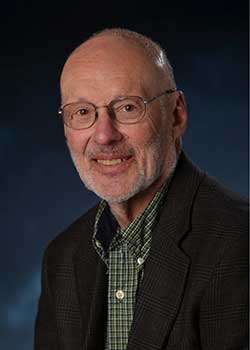The 2016 Pais Prize
By Peter Pesic,
Chair, Pais Prize Committee

Allan Franklin, 2015 Pais Prize Winner
The 2016 Abraham Pais Prize for the History of Physics has been awarded to Allan Franklin “for his path-breaking historical analyses of the roles of experiment in physics and for explicating the nature of evidence and error in scientific argument.”
Allan Franklin’s pioneering work has taken the study of experiment to a new level of scrutiny, detail, and insight. Drawing on his own experiences in experimental high energy physics, in the 1970s he turned to the history and philosophy of physics, thereafter producing a remarkable series of eleven books and many papers, which has set a new and high standard for investigating the process of experimentation and the problems of its interpretation.
Beginning with his book The Neglect of Experiment (1986), Franklin produced a series of trenchant case studies of important experiments and episodes throughout recent physics, ranging from the discovery of parity nonconservation, Robert Millikan’s oil-drop experiment, the existence and properties of the neutrinos (Are There Really Neutrinos?, 2000), to the searches for magnetic monopoles, gravitational waves, and a “fifth force” modifying Newtonian gravitation (The Rise and Fall of the Fifth Force, 1993). Throughout, Franklin treated the fine detail of the experiments he studied with great care, including the ramifications of instrumentation and statistical analysis. This allowed insight into the process of experimental physics to a degree rarely attained before. Beyond asking how observational data simply confirms or falsifies a theory, Franklin has given us a far richer picture of the complex process of assembling, assessing, and interpreting data.
Always cognizant of experiment as a social process in which discoveries are validated through consensus, Franklin has argued that physicists arrive at valid and objective knowledge about the world despite and through the difficulties of sorting out conflicting interpretations of experimental data (Experiment, Right or Wrong, 1990). In the process, his work engaged both with the philosophy and history of science and with ongoing controversies about the social construction of science. As a practical epistemologist at home in the laboratory, he brought to these debates the rich reality of experimental data, confronting the actual practice of science, its smoking wires and intense discussions.
There is a special appropriateness that Franklin, active both as a physicist and a historian of physics, takes his place among those awarded this prize named after Abraham Pais, a distinguished practitioner of both fields. Franklin received his bachelor’s degree in physics from Columbia College in 1959 and his doctorate from Cornell University in 1965. He has been a professor of physics at the University of Colorado since 1967, as well as a visiting professor at the California Institute of Technology, Indiana University, and the City University of New York. He has also been a research fellow at the Dibner Institute for the History of Science and Technology, the Center for Philosophy of Science at the University of Pittsburgh, and at Chelsea and King’s College, University of London. In 2000, he was named a Miegunyah Distinguished Fellow at the University of Melbourne. He was elected as a fellow of the American Physical Society for his work on the history of physics. In spring 2002, he received a Boulder Faculty Assembly Excellence in Research Award and was selected as the University of Colorado Distinguished Research Lecturer.
We are delighted to celebrate Allan Franklin’s extraordinary achievements honored by this year’s Pais Prize.
The articles in this issue represent the views of their authors and are not necessarily those of the Forum or APS.
